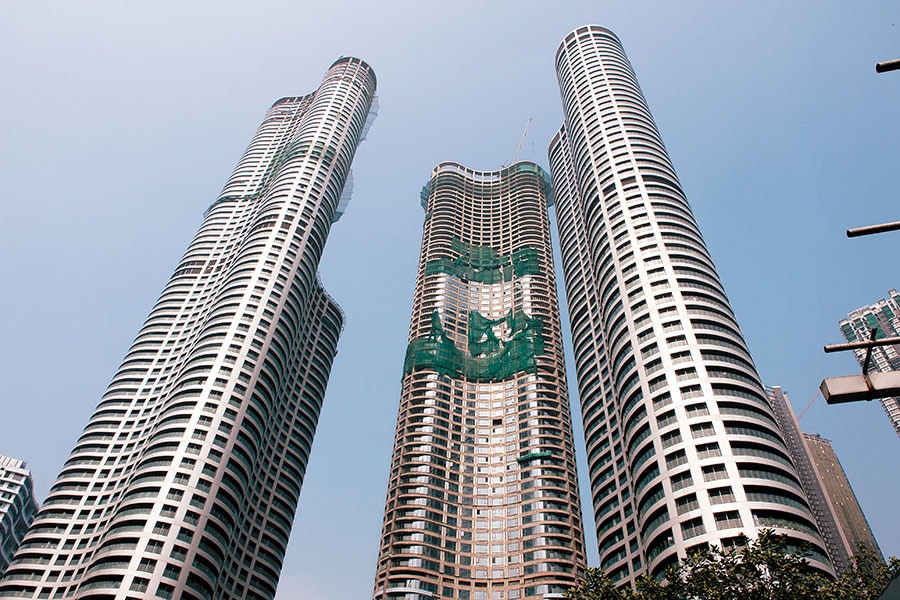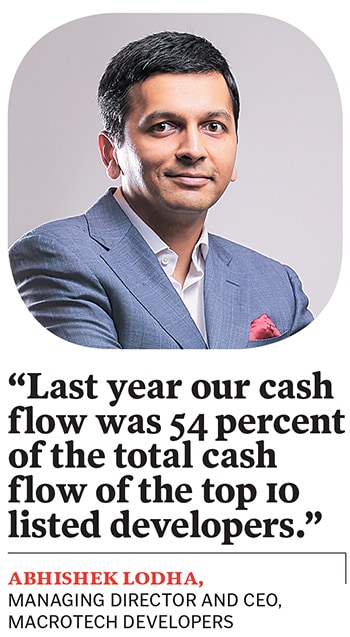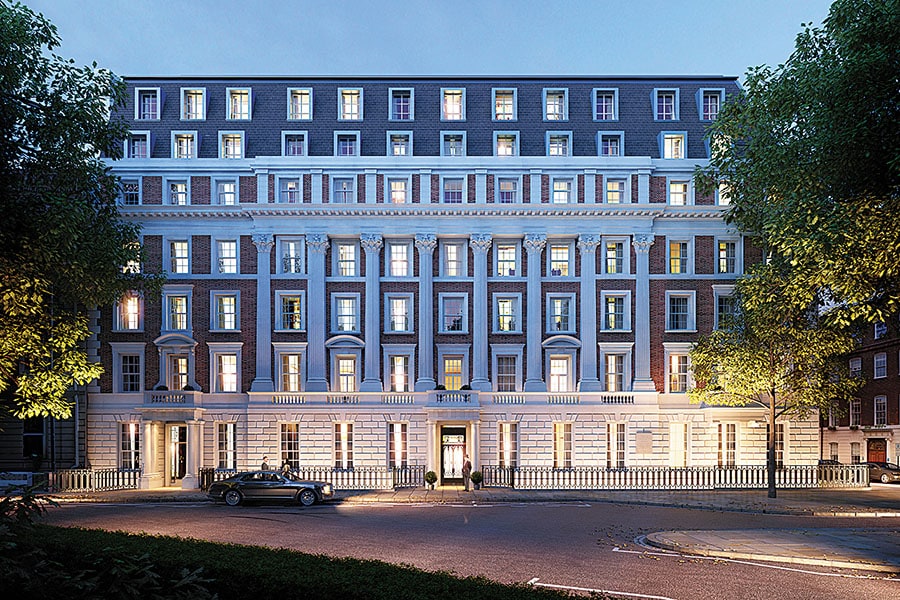Can Lodha tower over debt?
Abhishek Lodha's developments are finding takers and the group's profits are spurting—but so are finance costs and borrowings. Inside the next-gen scion's game plan to make his company net debt-free,


 The Lodha World Towers is a luxury project in Mumbai
The Lodha World Towers is a luxury project in Mumbai
Image: Mexy XavierIn August 2014, at a fancy red carpet event at Four Seasons Mumbai, which looked nothing less than a Hollywood movie premiere with golden barricades on the sides of the red carpet and glasses of bubbly being passed around in sleek glasses, sat the current President of the United States. Back then Donald Trump, more famous for his TV show The Apprentice and his real estate business, was flanked by son Trump Junior. And there was the man who had brought the two to the city and was to develop their Trump Tower in Mumbai: Abhishek Lodha, next-gen scion and managing director and CEO of the erstwhile Lodha Developers Ltd, officially Macrotech Developers Ltd since May 2019.
Two years before, in 2012, Lodha had swooped in to acquire DLF’s land parcel in the Lower Parel neighbourhood of Mumbai called NTC Mills for ₹2,727 crore. Back then DLF was the largest developer by market capitalisation, but the Delhi-headquartered realtor was stressed with nearly ₹23,220 crore in net debt and had started paring its national footprint and debt that provided Lodha the opportunity to fuel his ambition of transforming Mumbai’s skyline with a canvas of skyscraping luxury towers.
The construction of Trump Tower is now complete, Lodha has sold 80 percent of the project, with 451 apartments of 2,222 yet to be sold. That may not be a problem. There are other dangers: Of looming debt, downgrades by credit rating agencies and an all-important US denominated bond that comes up for redemption in March 2020.
Sitting in the meeting room of Lodha World Towers—the one cheek-by-jowl with Trump Tower—the 39-year-old Lodha shows few signs of stress: “Ultimately the proof of the pudding is in the cash,” he says with a smile. He’s confident of being net debt-free “in the next 24 to 30 months”.
At the end of March 31, 2019, the consolidated net debt of Macrotech Developers stood at ₹24,983 crore and it posted negative net cash flows as it ploughed back ₹1,729 crore for its overseas project. And then there are the downgrades, which began at a business in London.
Lodha Developers UK Ltd now consists of these two projects in which Macrotech Developers has an economic interest of 76.25 percent and 78.63 percent, respectively (as per a draft red herring prospectus the company filed before a planned public issue in 2018). It has completed one project and the other one is a few months away from completion. As per Macrotech’s FY 2019 annual report, it sold 158 units in its London properties for £468 million (₹4,349 crore). According to rating agencies, debt sanctions for Lincoln Square and 1 Grosvenor Square stand at £290 million (₹2,695 crore) and £517 million (₹4,803 crore) respectively.
Lodha says it has since sold units worth more than £600 million and expects to sell out both projects over the next 18 months the company expects free cash of about £550 million (₹5110 crore) from these two developments. Lodha insists it will be free cash after repayment of any liability. The net margins on its London projects are around 20 percent.
According to Lodha, the London assets have a debt of £750 million (₹6962 crore) against which they have already paid £200 million (₹1856 crore) in the last three months, and “the debt will be fully paid off by July 2020”. This means Lodha needs to pay £550 million (₹5,110 crore) in the next six months, but that may not be the big worry. What has been a matter of concern for the credit rating agencies over the last year has been the developer’s ability to pay off its dollar denominated bonds worth $325 million (₹2,241.15 crore).
Lodha confidently says, “We have made full arrangements for the repayment of the bond.” These include about $155 million which has been arranged through financing against unsold inventories in the London project, while another $110 million will be infused by promoters through family offices. Another $60 million will come through the recent sale of its commercial office property in New Cuffe Parade (Wadala), which it sold to a joint venture of the Tata Group and Varde Partners.
The realtor has sold its commercial office building in New Cuffe Parade for ₹1,350 crore of which the Tatas have paid ₹300 crore and Varde Partners the rest. The money came in during the last week of December.
For now Lodha is busy with roadshows for his next US-denominated bond. At the time of the interview in the third week of December, he said that they have already done two roadshows and discussions were on with investors to undertake a fresh bond issuance in February of $200 million.
Lodha rues that credit rating agencies and Indian investors don’t understand his business. On November 12, Moody’s Investor Service downgraded the corporate family rating of Macrotech Developers to Caa1 from B3 Caa1 indicates poor quality and very high credit risk, and B3 suggests speculative and a high credit risk. Later that month, India Ratings & Research downgraded the company’s non-convertible debentures (NCD) and bank loans to IND BB (moderate risk of default) and maintained a rating watch negative (RWN). The bank loan amount was ₹150 crore and NCDs worth ₹495 crore come up for maturity in July 2023.
Back to Bombaim
Lodha’s India business is geographically concentrated across the Mumbai Metropolitan Region (MMR). At the end of FY 2019, it had 38 ongoing projects in India across 28.59 million sq ft another 1.82 million sq ft are the London properties. In its India operations, the company managed to sell 6.4 million sq ft for a realisation of ₹7,162.7 crore in FY 2019 as against 7.4 million sq ft for ₹8,130 crore in FY 2019.
1 Grosvenor Square is one of Lodha’s two properties in London
According to its latest available annual report for FY 2019, on a consolidated basis Macrotech Developers posted revenues from operations of ₹11,907 crore for the full year, a 23 percent jump over the previous year. Net profit more than doubled to ₹1,647 from ₹794 crore in FY 2018.These numbers tell a story of growth, although finance costs too have headed northward—to ₹511 crore in FY 2019 from ₹203 crore in the previous year. The company states in its annual report that it has changed its accounting standards and a comparison to the previous year’s number isn’t fair.
But then there is the spiraling debt. Net debt of ₹19,006 crore at the end of March 2017 increased to ₹22,094 crore a year later (restated in the latest annual report), which means the company’s net borrowing went up by ₹3,088 crore in one year. By the end of FY2019, there was a jump of another ₹2,890 crore, taking the net debt up to ₹24,983 crore. In the last three years the company’s net debt went up by ₹5977 crore. Gross debt at the end of FY 2019 stood at ₹25,640 crore. Forbes India has calculated net debt by adding borrowings, current maturities and deducting cash and equivalents.
Lodha is unperturbed: “The performance (of the company) speaks for itself, if we had a mismatch there would be a problem somewhere, right?”
He reasons that the first thing that happens when a developer is short of cash flows is that he stops delivering his units, “…but that’s what Lodha is known for, for delivering units. For every four out of five units we build, more than 80 percent of the units are delivered ahead of time.”
According to the Lodha Group in an emailed statement, it has registered residential sales of around ₹5000 crore in April-December 2019. Of this, it claims it raised ₹2,000 crore in the festival period of October-December 2019, a growth of 30 percent over a year ago. By the end of FY2020, the Group expects to clock net new sales of over ₹7,000 crore.
On the debt front, the company says it has repaid its debt worth ₹1,500 crore and has plans to reduce it further by ₹2,500 crore taking the overall reduction in group debt by at least ₹4,000 crore this financial year itself. During the interview, Lodha said if needed, they would sell another commercial asset next year (2020) to pay off any debt requirements.
The Listings That Beckon
Lodha believes that because the company is a private one there is little information out there for the “gurus”. While this may be partly true, it isn’t that Lodha didn’t try to list the company a 2018 public issue had to be canned after markets tanked. In February 2019, Macrotech raised equity capital of ₹500 crore in its affordable housing project Palava City in Dombivli on the outskirts of Mumbai from Piramal Enterprises Ltd and Ivanhoe Cambridge, a real estate subsidiary of Canadian investment firm CDPQ through its joint residential equity fund. Palava is spread across 4,500 acres and Macrotech has completed Phase I comprising 300 acres work is underway on another 700 acres.
A listing of the entire company is now off the table. Lodha has new plans. “We have two focus areas: our affordable housing business and our office or rental business, so when we go to the public markets we want to make sure we take to the market separate opportunities for investment.”
undefinedThe London assets have a debt of £750 million against which the Lodhas have already paid £200 million in the last three months, and “the debt will be fully paid off by July 2020”[/bq]
The company’s medium-term plan includes launching a real estate investment trust for its rent-yielding assets in the next 2.5 years by when it expects to have 8-9 million sq ft of ready office space in its portfolio. At the end of March 2019, it had completed office leasing space of 3.83 million sq ft.
The long-term plan, which Lodha is evaluating, is a public listing of its affordable housing business. “But that is very preliminary.”
The realtor is evaluating proposals to raise equity capital at the project level for both affordable housing and premium residential projects. Last year it started its affordable housing brand Crown and has already launched two projects under the brand. Apart from that it is building an office in New Cuffe Parade and has launched a residential project in Lower Parel. It plans to launch one or two more projects by the end of March 2020.
That’s a far cry from the high-end housing ambitions of a few years ago. “Of course, when you think of Lodha, you think of all the premium and luxury housing that we build we have in the past built a lot of that but going forward clearly mid-income and affordable housing are the thrust of our business. That’s what our residential business is focused on and sales are very strong there.” Currently affordable housing accounts for 60 percent of the Indian business.
But it all boils down to the race between cash flows and debt repayments. Lodha admits he is “very concerned about reducing” debt and reducing it quickly. He estimates cash flows in the range of “₹8,000 crore to ₹9,000 crore” by March. If Macrotech Developers intends to repay all its domestic debt obligations in the next three years, it has to generate a net operating cash flow of a minimum ₹8,000 crore every year for the next three years it stands at a negative ₹465 crore. Even assuming that the India operations provided a positive cash flow of ₹1,264 crore in FY 2020, can Lodha climb this tower?
First Published: Jan 13, 2020, 15:46
Subscribe Now
